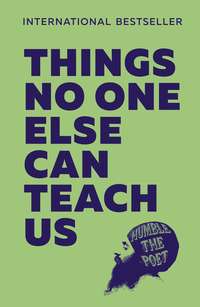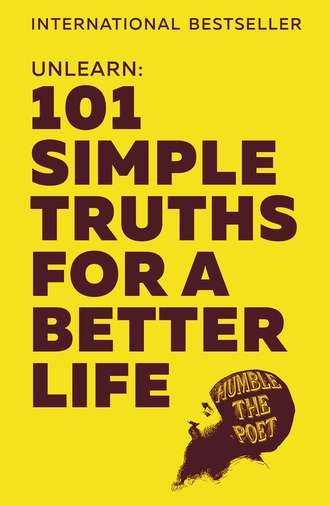
Полная версия
Unlearn: 101 Simple Truths for a Better Life
Let’s not get it twisted—I’m not a Zen Buddha baby. Bellyaching is still an art to me, and I complain about things that make first world problems look legit. I do, however, only give myself about ten minutes to be a Sad Panda before I move forward. I ask myself, “How did you want it?,” re-evaluate how it is, and try to tweak and adjust both to bring them a bit closer together.
Expectations are a bigger enemy to our happiness than our circumstances; the fewer expectations you have, the better off you are. Couple that with a Positive Pete set of goggles and things will feel even a bit more smile-worthy.
It’s also important to remember that everlasting happiness is a concept only promised by preachers and infomercials. It’s healthy to have a myriad (that’s a smart word for “a bunch”) of emotions occupying the hotel of your heart. Welcome them all in, and experience them the way they’re meant to be (just clean up afterwards). You’ll also realize the relationships between them. The less things anger you, the less things will excite you. The less things make you cry, the less things will make you laugh. Different life experiences are going to break barriers within you and you’ll respond emotionally to things you never connected to before (like getting all teary-eyed every time you watch the end of that Fresh Prince episode when his pops bails on him *sniff*).
The next time you’re having a Sad Panda moment can be the next time you ask yourself about the picture in your head and the picture in front of you. That moment of realization and discovery will put you in a position of power to mold both ends to bring them closer together. It works better than junk food—sometimes, that is.
PLEASE NOTE: Emotions are related to chemicals in your brain and a few paragraphs from a rhyming Beardo may not suffice. Don’t ever be afraid to seek help if you start to feel helpless and overwhelmed. I have, and it has helped a lot.
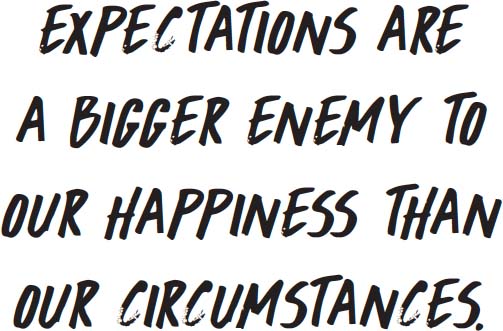

Fear is a gift.
I’m talking about the fear we have that gives us a jolt when in danger. The jolt gives us either what’s necessary to deal with that danger, or what’s necessary to get the fuck out of the way. That type of fear is something we only feel in the present, and it generally lasts for a short time.
Humans are funny creatures because we can carry fears even when out of danger. If you’ve ever been a victim of a crime you know how it lingers and disrupts the normalcy of your life for quite some time. It messes with your sleep, keeps you on edge in seemingly safe situations, and can serve to paralyze you when you try to move forward.
On top of that, we have this awesome (remembering that the word awesome doesn’t always mean a good thing) ability to create fear, not only in ourselves, but also in others. These fears include (but aren’t limited to) fear of failure, fear of disappointment, fear of embarrassment, fear of loss, fear of change, and fear of truth. These fears are technically considered phobias because they’re irrational and don’t actually involve danger.
Asking that girl for her number and having her reply with an “eww no” isn’t going to be the end of your existence. It may feel shitty, and the desire to not feel shitty may keep you from asking her. The same way the fear of disappointing others keeps you from switching out of biology class into a modern dance class, dating outside your bubble, or leaving your job as a teacher to be a rap singer.
These phobia-type fears aren’t gifts like the adrenaline rush you get when the car in front of you stops suddenly and you need to react tout de suite. That adrenaline goes away after a few minutes since it has served its purpose. Phobias only seem to grow in magnitude and multiply.
We all have these phobias, and the ones we carry are as unique as we are. As a mass of people, we can have collective phobias, and these phobias have been exploited and used to control us like lab rats for decades (word to Edward Bernays).
We avoid those feelings by playing it safe, or playing along. Our fear of exclusion motivates our assimilation. Our fear of not being noticed motivates our loud behavior. Our fear of loneliness motivates the personal sacrifices and compromises we think are necessary to be accepted by others. We’re all doing the same dance but think we’re in it alone because we’re moving to different music.
The courage we need to develop is not the knight-in-shining-armor, super-duper-confidence-unfazed courage. It’s the recognition of what we fear, and deciding that even with the tiniest baby steps, we move forward despite it. What you fear isn’t the roadblock; allowing the fear to keep you from moving is the real obstacle. FDR said it during one of America’s lowest times: “The only thing to fear is fear itself.”
Whenever I have issues or find myself feeling uneasy or hesitant, I ask myself, “What are you afraid of?” Answering that question clarifies who I am, and it’s the first step to overcoming that fear. In most cases, what I fear is dramatically worse than the reality of the situation.
As I go through these adventures being a public figure and hear every opinion across the spectrum, everything I ever feared people would think of me, they already have. Yet here I am, still breathing, beard still soft, rhymes only getting better, learning lessons even quicker. I’ve seen people dig themselves out of holes a million times worse than some of my created phobias.
No one is fearless, but the bravest people I know are those who are most in tune with their fears and phobias and have decided not to let them get in the way of their happiness.
As always, this is going to require you to have a conversation with yourself to discover these fears. Identifying them will be the first step to conquering them.
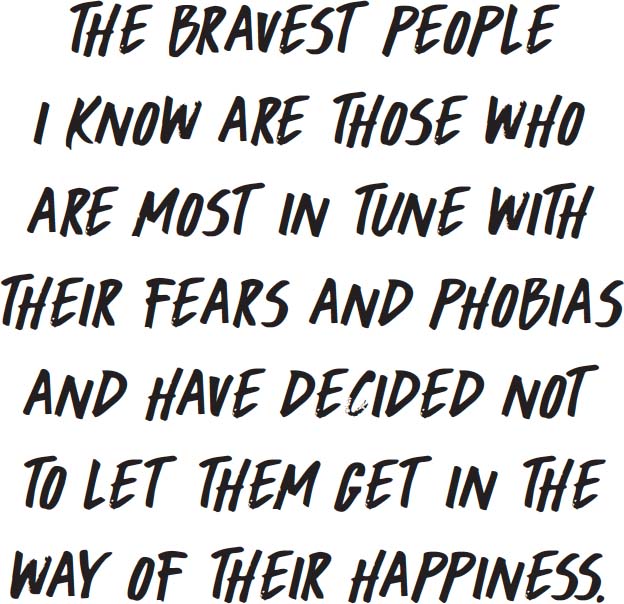

In the thickest New York accent you can imagine, one old lady says to another, “Let’s have strawberry shortcake to celebrate another day on Earth.” When the cake arrives the lady asks the waitress, “Did you remember to take out the calories?”
It was a Golden Girls moment (word to Sikh Knowledge), and it also reminded me of the never-ending power we have to paint the world we want to see.
There’s a lot of bullshit in the world. I’ve spent the majority of my artistic existence trying to shine a light on that bullshit. A result of doing so required me to dig deeper into issues, and myself, if I ever wanted to have anything new to say, without sounding like a (complete) hypocrite, with opinions on issues we all contribute to.
I learned a lot about how truth has no place in a world where people only want to see two sides: their side and the other side. The world is ten shades of grey, but that’s not very convenient for those who want to see in black and white, since that’s how they choose to paint the picture.
As humans, we seek affirmation over information. In simpler terms, we look for evidence to support what we already believe, and subconsciously ignore the things that contradict that. This isn’t necessarily a bad thing. If we didn’t have a device in our brains to ignore what we thought irrelevant, we’d be overloaded with redonkulous amounts of information that come at us every second of the day.
This can be a bit damaging if you’re married to an idea, and the repetition of information and people that validate that idea are all things you choose to expose yourself to (those are the key ingredients to your comfort zone). On top of that, it can be dramatically worse if the view you have of the world is that it is nothing but shit. Simply put, if you think life sucks, life will suck, and you’ll ignore your full fridge, running water, access to the internet, and ability to have leisure time to even contemplate how much life sucks.
Do you focus on the people who love you, or the ones who won’t return your calls? Do you share your problems or your joys with people? Realize, every thought you have is a brushstroke on the world you see. None of this negates the extreme issues the world is facing, but let’s not lose sight that many, if not most, of these issues were always in existence. Even viewing these issues is an opportunity for you to find some additional gratitude in the life you have, and motivation to spread some beauty, even if it’s on a local level.
The only reason you’re not good enough is because you’re thinking it. When I went to the Tim Burton exhibition, the first thing they showed was a rejection letter he received early in his career. He didn’t let that circumstance change the picture he was painting.
The old lady came up with the idea of ordering the strawberry shortcake after hearing another table sing “Happy Birthday” to their friend. She found inspiration in their celebration and found an excuse to celebrate herself.
Make an excuse to be happy right now and start painting with those thoughts. Your life is art, a work in progress, at that, and it’s only complete when you’re dead. Every day is a new day to see it the way you want.
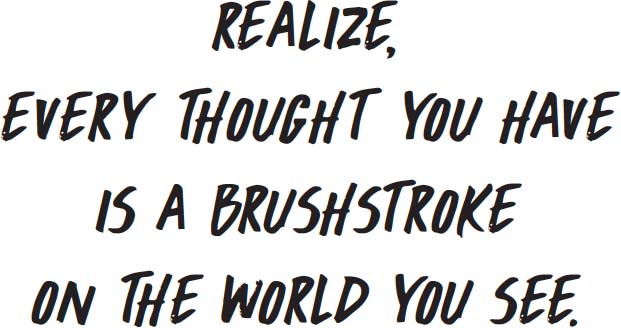

Relationships can be a death trap for dependencies.
I’m not talking solely about romantic relationships, I’m talking the whole shebang: professional, friends, creative, family, etc.
I’m not anti-relationship, I’m just pro–watch-out-for-developing-dependencies-in-your-relationship. When we put the key to our happiness in the pocket of others, we’re now at their mercy. Not all folks are looking to exploit the power they’ve been granted, but shit still tends to happen.
The most important relationship you have is with yourself—simple. Putting the responsibility of your smiles on anyone else will often lead to the opposite, and you have no one to blame except yourself. This anti-victim mentality isn’t popular because people don’t enjoy the onus, but it’s probably the only way to ensure a long-standing, healthy ability to have meaningful relationships.
We’ve cheapened the word love to the point that it’s common for someone to say they love you, and then no longer mean it a short time later. What is love really? Does a mother fall out of love with her child? If the dynamics of any relationship change, what usually causes it?
One answer is expectations. The love we seek is generally riddled with conditions, but the fairy tales make us feel that it’s unconditional. Respecting the fact that relationships are based on conditions may not be the most romantic, but it is the most realistic.
I encourage you to be independent—not because I want you to be, but because you already are. We’re born alone and die alone, and again, though it lacks romance, putting your relationship with yourself first dramatically enhances your ability to have relationships with others.
Dependencies aren’t healthy, whether on a substance, an idea, or another human being. In this sense, wanting less results in having more. Again, I’m not an idealist. In our daily lives we have to depend on people for things to get done, but if we acknowledge the dependencies early, it cushions the blow dramatically if expectations aren’t met. It can also serve to motivate us to be in a position to further reduce the dependencies we can survive without.
I’m not advocating a life of complete isolation and simplicity. I’ve always had a life rich with people and complexity, but at the same time I do find peace in simplifying and cleaning out the clutter.
I also know that if you’re not happy with yourself, nothing can compensate to fill that void.
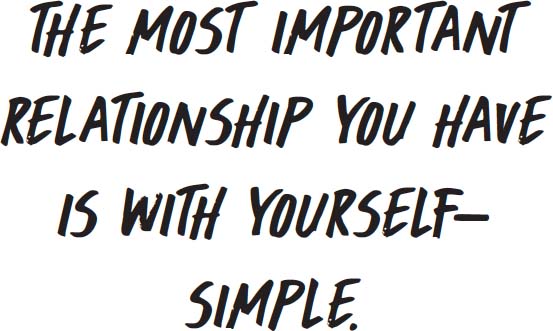

I know everyone reading this is haunted by a regret. Some boneheaded moment that you’d pay your left arm to get back; a mistake that in hindsight seemed so easy to spot, but not at the time.
Some of us will spend our days daydreaming of what life would have been like had we not made that mistake—oh, how much better everything would be.
Snap out of that shit.
You can’t predict the future, not even in your imaginary “what if” scenarios. When we’re not happy with our present, we can start wishing away our future by focusing on the past, or … we can do something about it NOW.
Regret is a burden we all hold, for whatever reason, and holding on does nothing but weigh us down. Learn from the mistakes of your past, thank them for occurring, and then gently push them into the wind and wave as they flutter away.
No decision is ever absolutely great or absolutely horrible—stop thinking so extreme. Understand your past, don’t waste time judging it. Understand your present, don’t waste time judging it. Use what you learn from these understandings to help create the future you want. This isn’t easy, and I promise you’ll fuck up some more in the future, but be ready for that, and when it happens, start digging for the jewels of wisdom that come from those foibles.
Folks can only love you for yesterday, but you can appreciate yourself for your present. Take a super-deep breath and hold it. Hold it a bit longer, then slowly breathe it out and keep blowing until there’s no air in your lungs. Congratulations, you just pressed reset.
Now move forward and create a life you want.
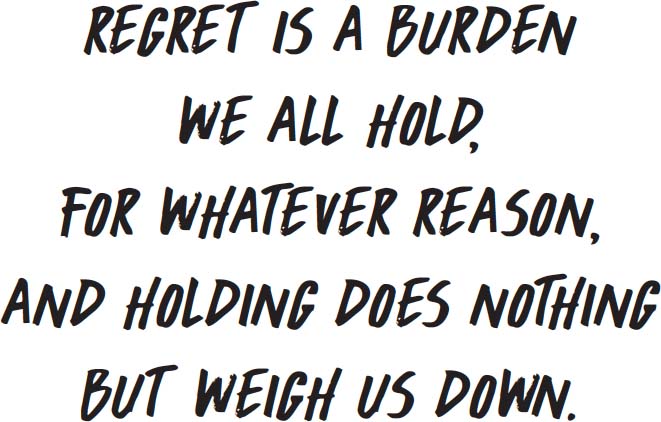

The less you give a damn, the happier you’ll be. Create a life that feels good on the inside, not one that simply looks good from the outside.
We can’t see other people’s struggles, pains, pressures, and anxieties. They put up the same front that we do. Trying to evaluate your life in comparison to others will always leave you more depressed for that simple reason.
When we focus on creating happiness from the outside then in, we’ll continue to fail because we’re using other people’s measures of success and pretending they’re our own. What makes you feel like a million bucks may involve a pair of ripped jeans and that T-shirt with the holes in it. How you feel is more important than how you look, and though I agree staying fresh can help the way you feel, the best thing you can wear is your confidence and happiness.
Don’t care what others think until you’ve taken your own thoughts into consideration. You can’t predict what other people think, and even if you could, it’s impossible to make everyone happy. The world is full of diverse opinions, and some of those opinions are in your favor, and some are not.
I don’t have the ability to get to know all of you on a personal level, but I’m super confident there’s something unique about each of you worth bringing to the forefront. Make your happiness worth more than the opinions of others.
Give a damn about yourself first, then those who give a damn about you, and then see if you have any damns left to give.
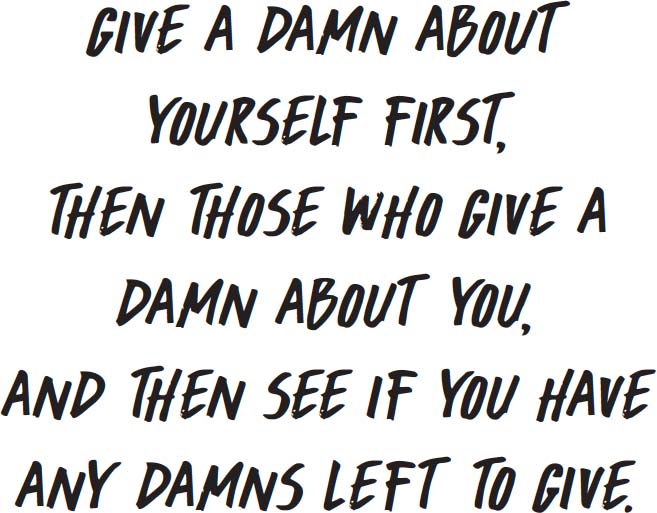

Loving someone can sometimes feel like you’re pouring everything into a bottomless pit.
You would give anything just to hear a splash at the end, just to feel they’re aware of your efforts and energy because right now, nothing feels good enough.
Maybe you can try harder, maybe you’re not doing enough, maybe you’re not good enough, or maybe, just maybe:
YOU’RE LOVING THE WRONG PERSON.
Love is something you share because you have it, not something you give desperately because you need it. The person at the top of your love list should be (drumroll … the suspense is killing me …) YOU.
If someone isn’t appreciating the love you send their way, then there needs to come a point when you wake up, get up, and walk away—not to make them miss you, but so you can recapture your dignity and self-worth.
I’ve said it numerous times, and I’m going to say it again: if you don’t love yourself, you have no business seeking love from others. Other people will exploit your need for love and affection for their own benefit; don’t hold that against them, just stay away from them.
If these words are hitting home, don’t pity yourself—love yourself and put yourself in the situation you deserve to be in.
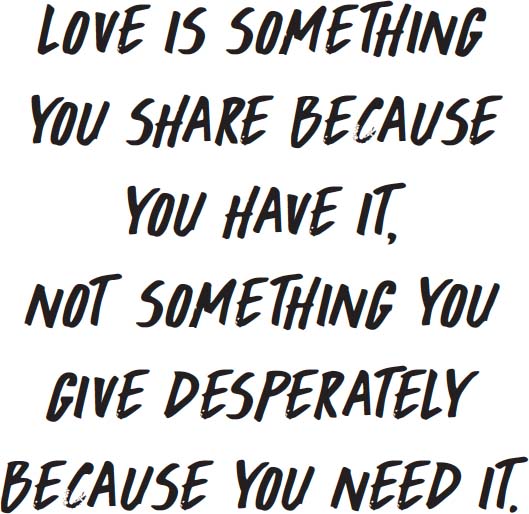

Your priorities are not revealed in your words, they are revealed in your actions, and your actions are revealed by your schedule.
You can say something (or someone) is important to you, but if it isn’t penciled in, you’re lying to yourself.
Tomorrow is not a promise—not even kind of. If fear is holding you back from doing what you want (or need) to be doing in your life, just realize that fear isn’t going anywhere, and everyone who has done something amazing has done it despite the fear, not in its absence.
Until science can do otherwise, we’re all ending our story with death. It’s really up to you how you use the days leading up to your eventual demise. The thought of death scares some, and makes others feel liberated. I like to remember, as long as there’s breath in my lungs I can create any life I wish to create (it won’t be easy, but nothing worthwhile is), and once the breath is gone, it doesn’t matter anyways.
Life is too short to be in any situation you don’t want to be in, and it feels even shorter when you’re with people you don’t want to be around. There aren’t any erasers to undo our past, but there are fresh pages to write a new chapter. I have great friends who mustered up the courage and strength to escape their comfort zones and place themselves in situations they would much rather be in. It took time and it was a struggle, but they came out as better people with better lives. You can do the same thing. It won’t be easy, but so what? Is there really a point to building a life if it isn’t the life you want?
I strongly encourage you to take risks; you’re worth it. The fear isn’t going to go away, so respect that relationship and work with it, around it, and despite it.
Let your actions do the talking from now on, and if something is important to you, let it show in your day-to-day movements.
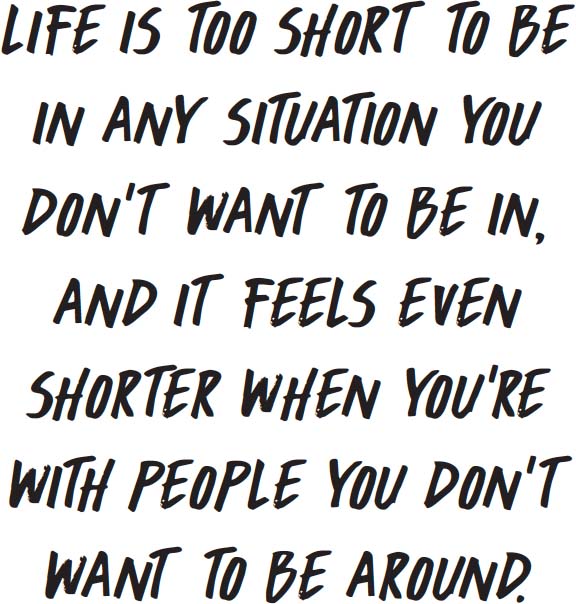

We all see this world in terms of ourselves. We all have interests and needs that need to be met first. This isn’t selfish. Selfish is when you don’t allow others to do their own thing and expect them to conform to what you want. You don’t want people restricting how you get to live your life, so don’t do it to others.
Focusing on yourself is really one of the least selfish things you can do. It puts you in a position to be empathetic to other people who are also trying to focus on themselves. You can develop an “Imma do me, you do you” mindset, which can create an environment that lets people grow on their own terms (scary idea for control freaks).
Instead of trying to find that right person for you, focus on becoming that right person yourself. The people you appreciate will generally be the people who appreciate you so be around them and work on being the type of person you want around.
Putting yourself first is an act of survival as well. We can all easily drain ourselves trying to accommodate the whims of others. We can spend our entire life trying to make other people happy, and realize we have no life left for ourselves.
It’s not romantic to think about how really self-indulgent we all are, but that doesn’t take away from that fact. If you understand that people work according to their interests, it’s even easier to work with them and get along. Everyone wants to know what’s in it for them; respect this ideal and everyone will benefit from the interactions.
Selfish isn’t pursuing what you want in life, it’s when you’re not also helping others in theirs. We all have things and people we’re enthusiastic about—help them, and find joy in doing so. I’m a product of all your support and I appreciate you all for it. I’m not in a position to help everyone, nor am I motivated to do so, so I focus on those I can and want to help. Social obligations and being around people you don’t want to be around are just a waste of life.
It’s OK to let people know that you’re not excited to be around them; if anything, that’ll keep you from having to be around them for much longer.
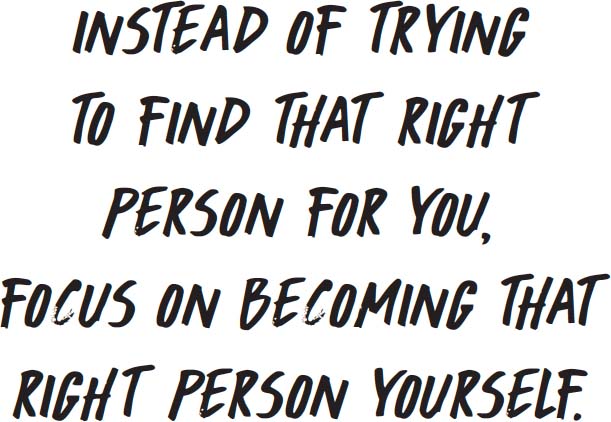

The world isn’t fair—never was, never will be.
To expect reciprocity for being a good person is like sticking your hand in the cage of a lioness and expecting her not to bite your arm off, because, after all, you wouldn’t do that to her.
If you want to be a good person, be a good person. If you want to be just, treat all fairly, and live in peace and harmony, go right ahead. However, please do not think that these lifestyle choices ensure or entitle you to the same in return.
Only in the movies do the good guys win; by that I mean only in the movies do we actually have good guys. In the real world, things cannot be simplified into good and bad so easily. Almost every privilege we have is the result of the exploitation of others. If the quality of life you are afforded—you being the person who has electricity and internet access—was provided to everyone on the planet, we would need a few extra planets. Our nature has become one of abundance and consumption, and that way of life, as fifteen thousand years of human history has shown, doesn’t come without a few cracked skulls.
The point I’m here to make isn’t one of pessimism but more of realism. Most of the problems the inhabitants of this planet are experiencing are caused by its inhabitants (well, not the bunny rabbits, or dolphins, or scorpions—mostly the humans). Before we start solving these problems, we have to stop causing them, thus no longer benefiting from them. Everyone is guided by self-interests, and on top of that, those interests are so different. Those interests not only overlap, but conflict with others, like those silly Iraqis who somehow stumbled upon OUR oil. Conflicting interests lead to conflict. Conflict can lead to death, and when humans are involved, death is the least of the creative things we concoct when dealing with individuals who stand in our way. Humans aren’t the only creatures that exhibit war and murderous behavior; we’ve just spent the most time perfecting that art.


